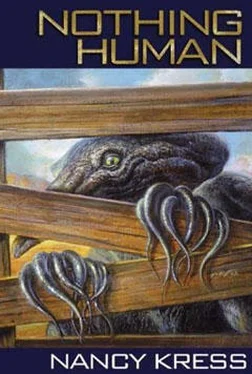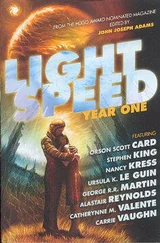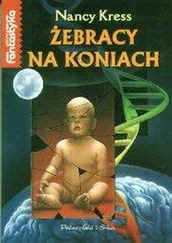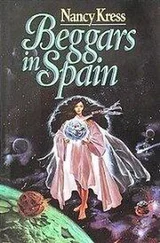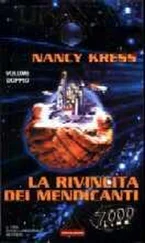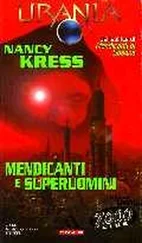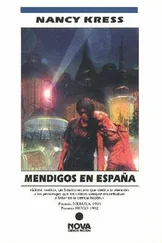“I guess the next thing is food,” Theresa continued. “Are you hungry? Senni, did you make that soup?”
“Yes,” Senni said sullenly. They’d argued about it before Theresa left. Silently Senni ladled out steaming bowls. Lillie got up and passed a bowl to each kid. She’d always been sensible, Lillie had. Solid. A few children started eating, but most did not.
Scott said, “Where’s your computer, Tess?”
Senni started. No one had called Theresa “Tess” for forty years.
“I’ll get it,” she told Scott, and fetched the ancient thing from the bedroom. Carlo kept it running, the only techie among her four children. She put the computer on the long wooden table.
“Good God,” Scott said, “does it work?”
“Not for me,” Theresa said. “You any good at tech, Scott?”
“I can manage. Voice control?”
“Only Three-A. You’d best use the keyboard except for simple stuff.”
Scott sat on a chair and turned the computer on. Abruptly Rafe rose from the floor and stood beside Scott. That’s right, Rafe had always been interested in machines. Theresa watched them, the sun-wrinkled middle-aged man (there was no other kind, now) and the young boy, who had been born in the same year.
Scott linked the computer to the wireless Net. Rafe said, “Basic information search. Rafael Domingo Fernando,” and Scott looked up at him.
“Not your name, Rafe,” he said gently. “You’ll be listed as dead. Your parents’ names.”
Rafe said, “Angela Santos Fernando and Carlos Juan Fernando.”
Scott entered the names. Theresa saw that he was trying to shield the screen from Rafe, who saw it anyway. Rafe said in a flat voice, “Both dead.”
“Do you have any siblings?”
“An older brother. Maximilliano Fernando.”
“Do you know his citizen I.D. number?”
“No.”
“Birthday?”
“September 7, 1996.”
“Okay. This is him… he’s living in Durham, North Carolina. There’s an e-mail address listed. Do you want to mail him?”
And say what? Theresa thought. Here I am, back from the dead, a fourteen-year-old kid?
Rafe said, his voice finally unsteady, “In… in a minute. Do someone else first.”
Theresa couldn’t stand it. All right, she was a coward, she couldn’t watch. She picked up Dolly. “Her diaper’s dirty. I better change it.” She carried the baby into the bedroom.
Senni followed her. “Mom, what the hell are you doing? Where are these kids supposed to go?”
Theresa turned on her daughter, glad to have someone to yell at. “I don’t know! But I couldn’t just leave them out there! These are—were—my friends! Lillie…” But there was no way to explain to Senni what she and Lillie had once been to each other, in those extraordinary circumstances that could never come again. “Senni, whatever the others do, Lillie at least is staying here. I know she hasn’t got anywhere else to go.”
Senni flounced out of the room. She, too, was pregnant, with her dead husband’s last legacy. Theresa sighed.
She lingered over Dolly, playing with her, rocking her to sleep, fussing with the blanket in the crib that Senni had made out of a dresser drawer.
When Theresa went back into the room, three girls were crying. Two boys yelled at Scott, who was showing superhuman patience. Sophie, whom Theresa had never liked, strode up to her and demanded, “Can you take me to the train today? Train to New York?”
“No, not today,” Theresa answered. She understood, as she had not forty years ago, that Sophie’s belligerence sprang from insecurity and youth. But Sophie didn’t understand that winds and storms made day travel on the plains risky; that a train all the way to New York was equally risky; that Theresa didn’t have the money for tickets for everybody; what New York would be like even if Sophie could get there.
“You won’t help me?” Sophie demanded. “You always were a bitch!” And then Lillie was there, taking Sophie’s arm, soothing her, and Sophie unexpectedly turned and buried her face in Lillie’s shoulder.
Theresa met Lillie’s eyes. Lillie smiled sadly.
“You must be scared, too,” Theresa said, out of the old, never-admitted antagonism that her friend could cope better, adapt quicker, control herself more.
“I am,” Lillie said, so softly that Theresa wasn’t sure of the words. But, then, she didn’t have to be. She understood, and her momentary resentment evaporated, never to return. Lillie was a child, still. And she, Theresa, was not.
The moon shone high and clear as Theresa drove the horse cart to town. They had a few more hours before dawn, before the winds began. Night on the high plains was still cool, even in July. Theresa and Lillie sat wrapped in blankets. “Is the horse old?” Lillie asked.
“No,” Theresa said, “just malnourished. Like most everything else, except you.”
Immediately she regretted her words. She’d intended them to be jocular, but they hadn’t come out that way. It wasn’t Lillie’s fault she was healthy when nothing else seemed to be. God, think how much worse it would be if sick kids had been dumped on the farm! By way of apology, she said to Lillie, “Are you feeling all right?”
“Yes,” the girl said. “Why are we taking a horse, Tess, instead of the bus or that little car?”
“The bus is illegal. Greenhouse emissions. The car is all right, it uses fuel cells to make electricity and gives off only water, but the car is old and I want to save it as much as I can.”
Lillie was quiet. So much of this must be strange to her. Tess said, “We have pre-war solar panels on the roof, too, you probably noticed them. They’re getting old as well. They mostly fuel the water pumps, while the wind power—” But Lillie wasn’t listening.
“Tess, this is your parents’ land in the New Mexico desert, isn’t it? We were going to come here once to hike.”
“We were?” Theresa said.
“Don’t you remember? We said that after we left Andrews Air Force Base to go home, we’d come here with your parents for a vacation. Together we asked Uncle Keith to let me go.”
Theresa didn’t remember. It was forty years ago. But not to Lillie.
The land had changed as much as she had, Theresa thought. She could recall it as she’d seen it at thirteen: a forsaken tract in the Chihuahuan shrub desert, bare of everything but mesquite, creosote, and yucca. Dry playas and arroyos. Nothing moving until you looked close enough to see the scorpions, lizards, and diamondbacks.
But all over the Earth, warming had brought climate shifts. Georgia now looked like Guatemala, Alberta like Iowa, Iowa like the edges of the Sahara. None of the computer models to predict warming consequences had been accurate, except to say that everything would get warmer. New Mexico was supposed to get a temperature increase of three degrees in spring, four degrees in winter and summer, with increased spring precipitation, decreased summer soil moisture, and spreading deserts.
It hadn’t worked out that way.
Her parents’ remote, worthless land bloomed. Its average annual rainfall had been fourteen inches in 2000, ninety percent of it between July and October, with an annual average evaporation rate of forty inches. But temperatures rose, wind patterns shifted violently, and El Nino events proliferated in the all-important Pacific, thousands of miles away. The beautiful clear desert air contained few pollutant particles to block sunlight and provide countering cooling, and so the temperature rose even more. Runaway greenhouses gases let plants use water in the soil ever more efficiently. Year by year, the average rainfall increased and the average evaporation decreased, until the numbers passed each other going in opposite directions.
Читать дальше
